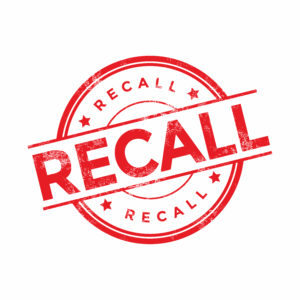Beginning in 2013, Toyota has recalled about 5.1 million driver and passenger airbags in the U.S. for defects that can cause the inflators to rupture, spewing metal shards into the vehicle. More than 1.5 million vehicles have not had the recall completed. The affected vehicles include:
- 2010-2016 Toyota 4Runner
- 2003-2013 Toyota Corolla
- 2003-2008 Toyota Corolla Matrix
- 2009-2013 Toyota Matrix
- 2004-2005 Toyota Rav4
- 2002-2006 Toyota Sequoia
- 2011-2014 Toyota Sienna
- 2003-2006 Toyota Tundra
- 2006-2011 Toyota Yaris (Hatch Back)
- 2007-2012 Toyota Yaris (Sedan)
- 2007-2012 Lexus ES350
- 2010-2017 Lexus GX460
- 2006-2013 Lexus IS250/350
- 2010-2015 Lexus IS250C/350C
- 2008-2014 Lexus IS F
- 2012 Lexus LFA
- 2002-2010 Lexus SC430
- 2008-2015 Scion XB

In all of the vehicles, with the exception of the 2004-2005 RAV-4, only the passenger airbags are affected. In the RAV-4, only the driver airbags are affected.
In December 2018, Toyota announced that some of the vehicles that previously had their airbags replaced need to be re-recalled because the replacements were the same type of problematic airbags, but newer, and allegedly less dangerous. Some automakers, including Toyota, originally used “like for like” replacements as they worked to find different airbags from other suppliers. The vehicles being re-recalled include the 2003-2005 Corolla, 2002-2005 Sequoia, 2003-2005 Tundra, and 2002-2005 Lexus SC vehicles.
You can check if your vehicle is part of the recall by heading to our Takata airbag recall page and using our VIN lookup tool.
Why Are Vehicles with Takata Airbags Being Recalled?
A total of 19 automakers have recalled almost 40 million vehicles that contain Takata front driver and passenger airbags. The recalled airbags contain the chemical compound ammonium nitrate, which is used as a propellant that is housed in a metal canister in the steering wheel or behind the passenger dash. In a crash, the propellant rapidly generates gas that inflates the airbag cushion. But ammonium nitrate, used by Takata as a cheap alternative to other more stable airbag chemicals, is volatile and can be unstable even under the best conditions. It is highly sensitive to moisture and heat, which degrades the propellant, and when ignited can generate too much gas too quickly over-pressuring the canister causing it to rupture and spewing metal fragments into the vehicle and occupants. Some Takata airbags, such as those in Honda and Acura vehicles made between 2001 and 2003, have an additional manufacturing defect, which, lab tests show, make them more likely to fail and rupture.
Toyota has had a longstanding relationship with Takata. According to Takata’s responses to the National Highway Traffic Safety Administration in its 2015 investigation, Toyota has known about the potential for airbag canister rupture since at least 2009, when inflators used by the Toyota (and Nissan) began rupturing in scrapyards in Japan. After Takata’s investigation, Toyota issued a recall in Japan and Europe in 2010 covering vehicles containing these inflators. Toyota did not recall U.S. vehicles with a variant of Takata inflators that also used ammonium nitrate, nor did it report the recall in the United States.
According to recall documents submitted to U.S. authorities by Toyota and Takata, a new wave of ruptures began occurring in Toyota vehicles in October 2011. Around the same time, two deaths resulted from similar Takata airbag ruptures in Hondas, but Toyota did not recall any passenger airbags in the U.S. until April 2013. Like other manufacturers, it has issued several incremental recalls since then. Despite its awareness of the rupture risk since 2009, Toyota continued to use airbags containing ammonium nitrate in some of its models through model year 2017.
Newsome Melton is currently accepting cases against Toyota and Takata. If you or a family member was seriously or fatally injured by a ruptured or aggressive airbag, you may have a valid case against the automaker and the parts manufacturer. We will evaluate your case for free and handle it on a contingency basis. This means you do not pay us unless you recover compensation for your losses. Call us today for your free, no-obligation consultation: 888-270-0717.

